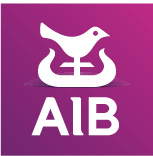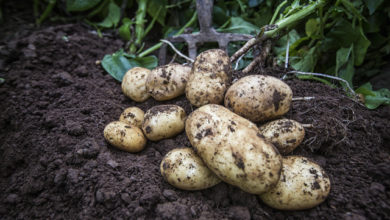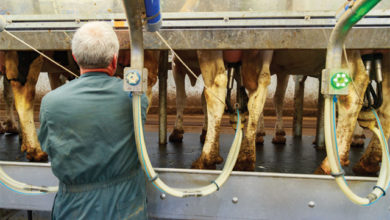AIB’s agri roots run deep

Left – Cathal O’Connor, Director in Corporate Banking responsible for the Food, Agri and Healthcare.
Right – David Kennedy Head of Corporate Banking food and agri team.
“AIB has a deep connection with agri-food industry supported by a broad range of expertise, products and services. While Brexit is the immediate challenge on the horizon, areas of sustainability, clean manufacturing and access to global markets all remain relevant…”
The agri-food sector has always been and remains paramount to AIB’s Group Strategy for growth and customer support. We have backed customers across the entire network, including farmers of all disciplines, smaller agri-food related businesses, regional SME’s, large privately-owned businesses and international PLCs.
Cathal O’Connor, Director AIB Corporate Banking, highlights AIB’s focus on developing strategic partnerships with the Bank’s larger customers. “Over the years we have developed very strong relationships with some of Ireland’s leading businesses, many of which operate in the agri-food sector. In Corporate Banking we offer customer-centric bespoke solutions. These solutions can be applied across the full range of banking services including corporate advisory, cash management, treasury products and debt via an ever-expanding array of structures. We’re here to help our customers achieve their ambitions, domestically and internationally.”
AIB Corporate Banking offers each customer a dedicated Relationship Manager supported by product expertise across a full suite of banking products services.
David Kennedy, Head of Food and Agri Corporate Banking Team, believes: “Evolutions in various forms of asset finance is increasingly a key component to AIB’s offering in the agri-food sector.” AIB (through its Commercial Finance Division) has a long history in invoice discounting, with transactions ranging from €1 million to over €100 million. “AIB has been investing to develop its product offering in this regard as our customers demand structures in a variety of asset classes. In certain circumstances, non-recourse receivables financing can be very beneficial to borrowers and this is an area in which AIB can be of particular benefit for customers in the domestic market. Stock and supplier financing are other areas where AIB Corporate Banking in conjunction with AIB Commercial Finance continue to develop and invest.
Brexit remains an area of focus for customers in the sector and the Corporate Banking team works closely with the teams in Treasury and the Economic unit to help customers navigate these challenges.
Oliver Mangan, Chief Economist in AIB, comments that Brexit remains a real concern for Ireland and in particular the agri-food sector, which is very reliant on exports to the UK market. To date, there has been limited impact on the Irish economy from Brexit, aside from the adverse movement in the EUR/GBP exchange rate. The sharp weakening of sterling since 2016 has clearly impacted those trading with the UK, although Irish companies have become used to dealing with a weak and volatile sterling during most of the past decade.
The Bank of England has observed that the progress made at the end of last year in the EU-UK Brexit negotiations has “reduced the likelihood of a disorderly exit”. This is welcome news. It is hoped that agreement can be reached in spring 2018 on a transition period being put in place when the UK departs the EU in March 2019, which would leave the current trading arrangements largely in place until 2021. This should allow for a soft Brexit and permit the talks to proceed to discussing the future trading relationship between the UK and EU.
However, there is continued risk of a hard Brexit in 2019, whereby the UK loses free access to EU markets, given the deeply divided views in the UK, including within the British Government, on what form the future trading relationship with the EU should take. The more the UK looks to regain control over policy from Brussels when it leaves the EU, the less access it is likely to have to the EU’s single market.
Thus, Irish businesses should not be lured into a false sense of security by the progress made on the Brexit negotiations to date. The real talks have yet to commence on the future trading relationship between the EU and UK and are likely to prove difficult. Indeed, if agreement is reached on a two-year transition period post Brexit in March 2019, it is likely to be 2021 before we know if free trade will continue between the UK and EU in the coming decades.
AIB is proud to have supported the Irish agri-food sector across all levels for many decades. In the climate of uncertainty created by the British decision to withdraw from the EU, this support is more important than ever.
In relation to currency volatility Stuart Banks, Senior Dealer AIB Treasury, comments that while EUR/GBP has steadily retreated from a post Brexit high of 0.9267 in August 2017, to trade close to an 18-month average of 0.87 at the end of January 2018, the outlook remains uncertain. Exchange rate certainty is the cornerstone of every treasury policy from a foreign exchange hedging perspective. How this certainty is achieved will vary from business to business and can range from using ‘take profit’ and ‘stop loss’ Forex (FX) orders combined with vanilla hedging products through to the use of various FX derivatives. AIB Treasury can assist in reviewing a company’s treasury policy to ensure it meets the ongoing requirements of the business.
In relation to banking services provided at farmer level, AIB has been a leading bank to the farming sector over many decades, with a dedicated regional Agri Advisor Team in place since the 1970s.
Anne Finnegan, Head of Agri Sector, notes that 2017 was a strong year for farm investment in Ireland, and AIB experienced strong demand for credit throughout the year. Improved output prices in the dairy, beef and pork sectors coupled with the availability of grant aid under the TAMS II farm investment scheme, all contributed to this demand. New lending to the Agri sector increased by 20 per cent in the first three-quarters of the year above the corresponding period in 2016 as reported by the Central Bank of Ireland. While some of this growth can be attributed to the SBCI Agri Cashflow Support Loan, which was available at the start of the year, there was a strong demand for credit from farmers who were investing in productive assets, farm facilities and equipment throughout the year. Research conducted on behalf of AIB by Ipsos MRBI (April-May 2017) identified that half of Irish farmers plan to invest, an average of €44,000 in their farm business in the next three years – principally upgrading existing infrastructure and machinery. While Irish farmers continue to advance their farm operations; at the same time, they are continuing to reduce their business exposure. Overall, farm related debt is on a downward trend, reducing by close to 40 per cent since its peak in 2009.
Cathal O’Connor concluded by advising: “AIB has a deep connection with agri-food industry supported by a broad range of expertise, products and services. While Brexit is the immediate challenge on the horizon, areas of sustainability, clean manufacturing and access to global markets all remain relevant with different challenges and opportunities evident. Working closely with our customers, AIB is available to assist working through the challenges and maximising opportunity to help customers realise their ambitions.”
Contact:
David Kennedy
Email: david.kennedy@aib.ie
Tel: +353 (0)1 641 2018
Cathal O’Connor
E: Cathal.T.O’Connor@aib.ie
T: +353 (0)1 641 4812







